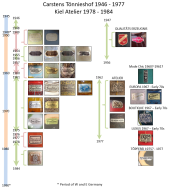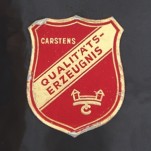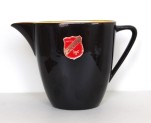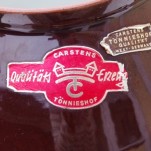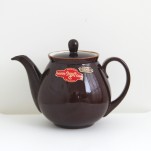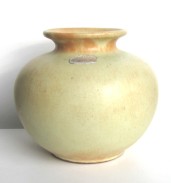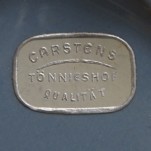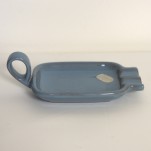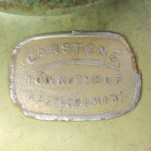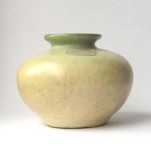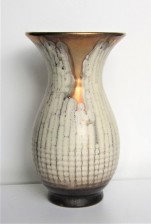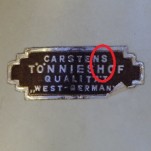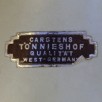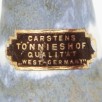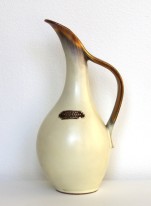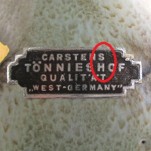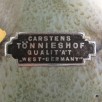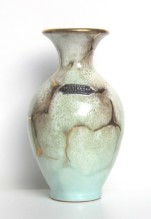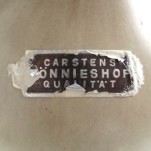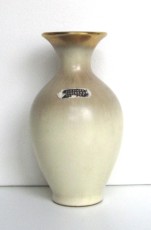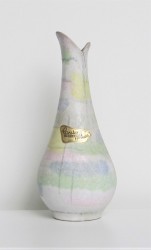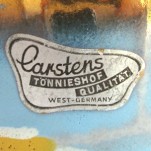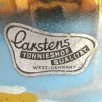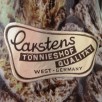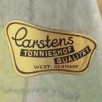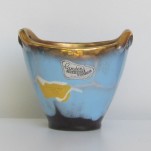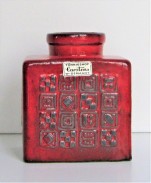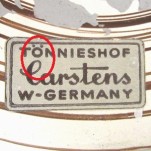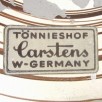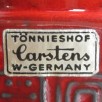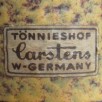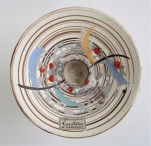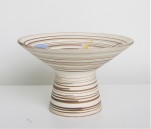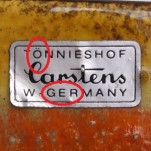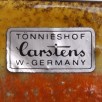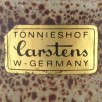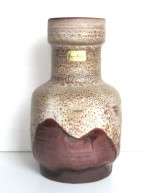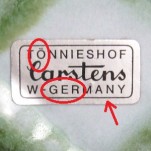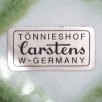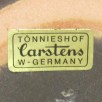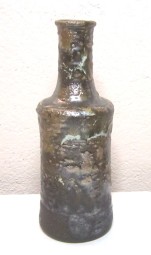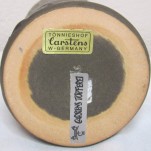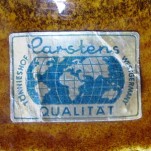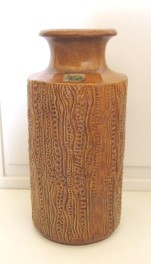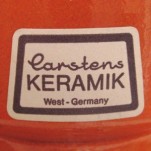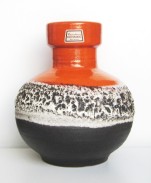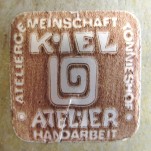Carstens Tönnieshof 1946-1977 (1984)
Labels Page 1
1947 - 1977 (1984)
Labels Page 1
1947 - 1977 (1984)
Carstens Tönnieshof Labels - Table ceramics 1947? - 1956?
The production of table ceramics started at Tönnieshof 1947. The first labels are probably the labels with the text "QUALITÄTS ERZEUGNIS" and the Carstens Tönnieshof loggo with the twin houses. There are two types of these labels. One label has the form of a crest with the text "CARSTENS QUALITÄT ERZEUGNIS". The colour is red and gold. The other is a large, wide label with the twin hous loggo in the center and the text "CARSTENS TÖNNIESHOF QUALITÄTS ERZEUGNIS". The colour is red and silver.
A tea pot has both the large, wide label and the Carstens labels used ca.1955-1956, so this label was at least used until ca.1956.
CARStens tönnieshof Labels 1949? - 1954?
The earliest known labels on decorative ceramics are two rounded labels in yellow and silver. It comes in two versions, One with the text "CARSTENS TÖNNIESHOF QUALITÄT" and one with the text "CARSTENS TÖNNIESHOF WEST-GERMANY". The label with "WEST-GERMANY" must be at the earliest from 1949. It is easy to conclude that the label with the text "QUALITÄT" was used earlier than 1949, however the next generation of labels also comes in two versions, one with "WEST GERMANY" and one with "QUALITÄT". I therefore assume that these two versions were used at the same time. This rounded label has been documented on ads from 1954.
carstens tönnieshof Labels 1955? - 1956?
The next generation of Carstens label is a rectangular shaped label with the text "CARSTENS TÖNNIESHOF QUALITÄT "WEST-GERMANY" ". The colours of the labels are darkbrown & silver and darkbrown & gold.
There are two versions of this label:
-"S" in "CARSTENS" is not in line with "H" in "TöNNIESHOF" (common label).
-"S" in "CARSTENS" is in line with "H" in "TöNNIESHOF" (rare label, only known in darkbrown & silver).
This label also comes in a very rare version, without the text "WEST-GERMANY". This label is only known in brown and silver.
The exact years these labels were used are not known. The previous label is dated to be used until 1954 and the next generation of labels is dated to be used 1957. These labels were therefore probably used ca.1955-1956. Decors from these years like Utrecht (1955) and Graz (1956) are common with this label.
Carstens Tönnieshof Labels 1957? - 1960?
The next generation of label has an irregular shaped form with the text "Carstens TÖNNIESHOF QUALITÄT WEST-GERMANY". The family name "Carstens" uses a font in handwriting. This font in handwriting is then used for the family name on all later labels. The labels comes in three colours, silver & black, bronz & black and gold & black.
This label can be found on ceramics with the decor Rimini from 1957 and on several other decors from 1957 like Havaii and Brabant. Heinz Siery began to work with Carstens 1959 and a lot of new designs by Heinz S were introduced 1960, like 626-26 and 627-29. Many of these ceramics can be found with this label as well as the following label. This label was therefore probably used atleast until 1960.
Carstens Tönnieshof Labels 1961? - 1975?
From the early 60s to the mid 70s Carstens used a rectangular label with the text "TÖNNIESHOF Carstens W-GERMANY". This labels comes in two, or maybee three generations.
-First generation: Thick font. "Ö" is more to the left. Three colours; Brown & White (Paper label), Light brown & brown (Paper label) and gold & black.
-Second generation: Thin font and G and R has a new font in GERMANY. Two colours; Silver & , Black, Gold & Black. This label comes in two versions (or generations?):
- "Ö" is more to the left.
- "Ö" is more to the right. The frame around the text is also more closer to the text making the frame slightly wider.
The first generation was introduced ca 1961 and was used many years. The series Manilla from 1967-1968 and Ankara from1963-1969 are only known with this label. The years this label was used where therefore ca. 1961- ca 1969. The second generation of label is also found on designs and decors that are typical for the 70s. The label with the "Ö" more to the right, is very rare and can be a late third generation of the label. Since Carstens used one additional last label before the company ceased 1977, I guess that these labels were used ca. 1970 - ca. 1975.
Carstens also used a label with a world map and the text "Carstens Qualität TÖNNIESHOF WESTGERMANY". The colour is gold & blue. It is not known if this label was used for a special series or not. It can be found on ceramics from the Europa series (with base mark E.) and on other ceramics from the end of the 60s but it is not known if this label represent the Europa series or another series.
TÖNNIESHOF
Carstens
W-GERMANY
ca.1970 - ca.1975
Thin font.
"Ö" is more to the left.
"G" and "R" has different font.
TÖNNIESHOF
Carstens
W-GERMANY
ca.1970 - ca.1975
Thin font.
"Ö" is more to the right.
"G" and "R" has different font.
Wider frame.
Carstens Tönnieshof Labels 1976? - 1977?
The last labels is probably a label with the text: "Carstens KERAMIK West-Germany". The colour is Brown & White. The font for "Carstens" is the same as was used on the label with the "world map from 1968-1970. This label is very rare so it was probably only used the very last years before the company ceased.
Kiel Atelier Labels 1978 - 1984
After the bankruptcy 1977 a new company, Kiel Atelier, was founded. The new company used several different labels with the text "KIEL". Kiel Atelier ciesed 1984.
